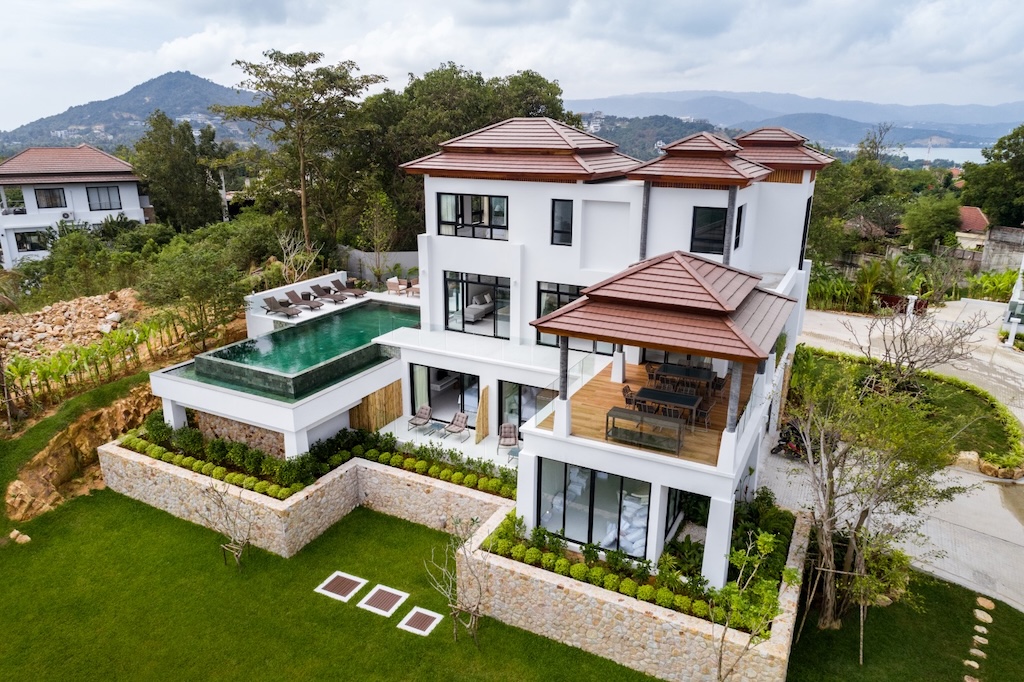
The Thailand real estate market is poised for significant growth and transformation. With a combination of favorable economic conditions, increasing foreign investment, and evolving buyer preferences, Thailand presents a compelling landscape for both local and international property buyers. This article delves into the key trends, opportunities, and challenges that define the Thailand real estate market in 2025
Economic Outlook for Thailand’s Real Estate Market
The economic forecast for Thailand in 2025 is optimistic, with expected growth rates ranging from 2.8% to 3.0%. This recovery is largely fueled by a resurgence in the tourism sector, which is anticipated to rebound to pre-pandemic levels. A robust economy typically translates to increased consumer confidence, leading to higher demand for housing.
Key Economic Drivers
- Tourism Recovery: The tourism industry, a significant contributor to Thailand’s GDP, is expected to see a substantial influx of international visitors. This resurgence will drive demand for both residential and rental properties, particularly in tourist hotspots like Bangkok, Phuket, and Pattaya & Koh Samui.
- Government Initiatives: The Thai government is likely to extend existing property measures, such as reduced transfer and mortgage fees, to stimulate the housing market. These initiatives aim to encourage property transactions and support economic recovery.
- Private Consumption: Rising disposable incomes and increased private consumption will further bolster the real estate market. As more individuals seek homeownership, the demand for residential properties will rise.
Challenges Ahead
While the outlook is positive, challenges remain. High household debt levels and potential interest rate hikes could deter some buyers. Additionally, geopolitical tensions and global economic fluctuations may impact investor confidence and foreign direct investment in the Thailand real estate market.
Trends Shaping the Property Market
Several trends are shaping the landscape of the Thailand real estate market as we move into 2025. Understanding these trends is crucial for potential buyers and investors looking to capitalize on emerging opportunities.
1. Rise of Sustainable Living
There is a growing emphasis on sustainability and eco-friendly living among homebuyers. Developers are increasingly focusing on green building practices, energy-efficient designs, and sustainable materials. This trend is not only appealing to environmentally conscious buyers but also aligns with global movements towards sustainable living.
2. Shift Towards Low-Rise Developments
In contrast to high-rise condominiums, low-rise housing options are gaining popularity. This shift is driven by the demand for larger living spaces that accommodate remote work and family needs. Low-rise developments, such as townhouses and single-detached homes, offer more space and are often viewed as more affordable alternatives.
3. Mixed-Use Developments
The concept of mixed-use developments is becoming increasingly prevalent in urban areas. These projects combine residential, commercial, and recreational spaces, offering residents convenience and a vibrant lifestyle. Areas like Bangkok are seeing large-scale mixed-use projects that cater to the needs of modern urban dwellers.
4. Increased Interest from Foreign Buyers
Thailand continues to attract foreign investors due to its favorable living conditions and investment opportunities. The country’s affordable property prices, coupled with attractive visa programs, make it an appealing destination for expatriates and retirees. Key cities such as Bangkok and Phuket are witnessing heightened interest from international buyers seeking both residential and rental properties.
Popular Locations for Real Estate Investment
Certain regions in Thailand stand out as prime locations for real estate investment in 2025. Understanding these areas can help investors make informed decisions.
1. Bangkok – As the capital and economic hub of Thailand, Bangkok offers a diverse range of properties, from luxury condos to affordable apartments. Areas like Sukhumvit and Sathorn are particularly popular among expatriates and investors due to their vibrant lifestyle and proximity to business districts.
2. Phuket – Phuket remains a top choice for real estate investment, particularly in the luxury segment. The island’s stunning beaches and thriving tourism industry make it an attractive destination for vacation homes and rental properties. Investors are increasingly looking at beachfront villas and high-end condos as viable options.
3. Chiang Mai – Known for its rich cultural heritage and serene environment, Chiang Mai appeals to retirees and those seeking a slower-paced lifestyle. The city offers affordable property prices and a growing expatriate community, making it a favorable location for long-term rentals.
4. Pattaya – Pattaya is evolving as a vibrant resort city with a dynamic real estate market. The area is popular for its entertainment options and proximity to Bangkok, attracting both local and foreign buyers. Affordable property prices and high rental yields make Pattaya an attractive investment destination.
5. Hua Hin – Hua Hin combines a relaxed coastal lifestyle with a burgeoning real estate market. The area is popular among retirees and holiday makers, with high demand for luxury condos and beachfront properties. Infrastructure improvements, including planned high-speed rail links to Bangkok, further enhance Hua Hin’s appeal.
6. Koh Samui – Thailands boutique island, a popular destination for families and couples seeking a more luxury experience with a relaxing island vibe and world class dining. The island is a firm favourite amongst those looking to invest in luxury real estate with the majority developments focused on villas rather than condos.
Investment Opportunities
As the Thailand real estate market continues to evolve, numerous investment opportunities arise for discerning buyers.
1. Luxury Properties – The demand for luxury properties is on the rise, particularly in tourist-heavy areas. High-net-worth individuals are seeking exclusive villas and condos that offer premium amenities and breathtaking views. Developers are responding with high-end projects that cater to this affluent market.
2. Eco-Friendly Developments – Investors interested in sustainable living will find opportunities in eco-friendly developments. Properties that incorporate green technologies and sustainable practices are becoming increasingly sought after, appealing to a growing segment of environmentally conscious buyers.
3. Rental Properties – With the anticipated increase in tourism, rental properties present a lucrative investment opportunity. Areas with high tourist traffic, such as Phuket and Bangkok, are ideal for short-term rental investments, providing consistent cash flow and potential appreciation.
4. Mixed-Use Developments – Investing in mixed-use developments can offer diversified revenue streams. These projects often combine residential, commercial, and retail spaces, attracting a variety of tenants and customers. The demand for such developments is expected to grow as urbanization continues.
Legal Considerations for Foreign Buyers
Foreign investors looking to enter the Thailand real estate market must navigate specific legal considerations to ensure a smooth purchasing process.
1. Understanding Foreign Ownership Laws – Foreigners can own condominiums outright, provided that the total foreign ownership in the building does not exceed 49%. However, purchasing land is more complex, often requiring a long-term lease agreement. Understanding these regulations is crucial for foreign buyers.
2. Engaging Legal Assistance – It is advisable for foreign investors to engage legal assistance when navigating property transactions in Thailand. Legal experts can provide valuable guidance on ownership laws, contracts, and any potential risks associated with property investments.
3. Due Diligence – Conducting thorough due diligence is essential before making any property purchase. Buyers should verify property titles, review contracts, and assess the reputation of developers to mitigate risks and ensure a secure investment. Here we have a selection of reputable law firms.
The Role of Technology in the Thai Property Market
Technology is playing an increasingly vital role in shaping the Thailand real estate market. From property search platforms to virtual tours, advancements in technology are enhancing the buying experience for consumers.
1. Online Property Portals – Digital platforms like Thailand Property Hub are revolutionizing the way buyers search for properties. These portals provide comprehensive listings, detailed property information, and user-friendly interfaces, making it easier for buyers to find their ideal homes.
2. Virtual Tours and Augmented Reality – Virtual tours and augmented reality applications are becoming popular tools for prospective buyers. These technologies allow potential buyers to explore properties remotely, saving time and providing a more immersive experience.
3. Smart Home Technologies – The integration of smart home technologies is gaining traction in new developments. Properties equipped with smart features such as automated lighting, security systems, and energy-efficient appliances are appealing to tech-savvy buyers seeking modern living solutions.
The Future of the Thailand Real Estate Market
Looking ahead, the Thailand real estate market is expected to continue its upward trajectory. Factors such as economic recovery, increasing foreign investment, and evolving buyer preferences will shape the market landscape.
1. Continued Growth – The projected growth of the Thailand real estate market is promising, with estimates indicating a compound annual growth rate (CAGR) of approximately 5.41% from 2024 to 2029. This growth is supported by ongoing government initiatives and a favorable investment climate.
2. Evolving Buyer Preferences – As buyer preferences shift towards sustainable living, larger spaces, and mixed-use developments, the market will need to adapt. Developers who embrace these trends will likely find success in meeting the demands of modern consumers.
3. Resilience Amid Challenges – Despite potential challenges such as high household debt and geopolitical uncertainties, the Thailand real estate market has shown resilience. A proactive approach from the government and industry stakeholders can help mitigate risks and foster a stable investment environment.
Conclusion – In summary, the Thailand real estate market in 2025 presents a wealth of opportunities for investors and homebuyers alike. With a favorable economic outlook, evolving buyer preferences, and a growing emphasis on sustainability, Thailand is poised to remain an attractive destination for real estate investment. Whether you are a foreign investor seeking a vacation home or a local buyer looking for your dream residence, the Thailand real estate market offers diverse options to suit your needs. Embracing the trends and understanding the legal landscape will be crucial for navigating this dynamic market successfully.





